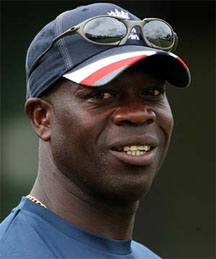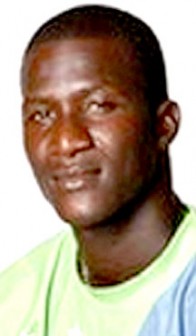By Tony Cozier At the ICC World Cup In DELHI
As the West Indies flew out of Dhaka yesterday, their transport swept past a small group of fans carrying placards proclaiming “Sorry WI” and “We love you, WI”.
It was contrition from diehards in the cricket-obsessed country for the widely publicised stoning of the West Indies’ team bus following their embarrassing thrashing of Bangladesh in the heart of the home team’s capital city in a key World Cup match the day before.
One young man held a large bunch of flowers but he never got close enough to the intended recipients to present it. Perhaps he will return when they are likely to do for one of the two quarter-finals scheduled for Dhaka at the end of the month.
For the time being, they had a plane to catch on the way to Delhi, intransiting to Chanigarh in north India for their next match against Ireland on Friday.
Head coach Ottis Gibson had plenty of time on the four-hour journey to consider how to limit the potential effect of the six-day break that lies ahead.
“The task now is to keep everyone focused in the days leading up to the Ireland game,” Gibson said. “We knew how dangerous they can be even before they upset England so there’s no way we’re going to take them for granted.”
Victory over the Irish, one of four associate teams in the Cup, would secure the West Indies a quarter-final place. After that, it becomes a straight knockout – in other words, two matches to the final, three to the Cup itself.

“The team was outstanding on Friday but we can’t get ahead of ourselves. It’s one match at a time.”
Gibson said he would give the players a couple of days off before getting back into preparation mode.
They are justifiably eager to maintain the intensity that made them so irresistible in Dhaka so the impending wait is untimely. But the structure of a competition involving 16 teams is such that each team has had to contend with an irritating interruption along the way.
Australia were unoccupied for eight days before their first real test, against Sri Lanka in Colombo, yesterday. They were then further frustrated when rain allowed only 32.5 overs of one innings before abandonment.
With earlier victories over Zimbabwe and New Zealand with Kenya and Canada to come, the champions of 1999, 2003 and 2007 are certain of a quarter-final spot.
But keyed-up cricketers are here to play for real, not to hang around for a week’s practice and training sessions between matches, no matter how luxurious their five-star hotels.
The situation was the same in the Caribbean four years ago.
After all-rounder Andrew Flintoff was disciplined by the England management for
his widely-publicised night-time escapade on a pedalo in St. Lucia and other players fined after seen out partying, the South African media questioned captain Graeme Smith about reports of the nocturnal activities of some of his men.
His retort was instructive. It was that it was better for virile, young athletes to let off some steam than be confined to barracks while waiting a week between matches.
The answer is getting the balance right, as Gibson must now do.
He, captain Darren Sammy and the senior players will also be interested in the pitch at the Mohali Stadium, the one in India generally considered to better suited to seam than swing bowling.
Nothing could be properly assessed from its only World Cup engagement so far, a mismatch in which South Africa, ever increasing as tournament favourites, trounced Holland by 231 runs (351 for 5 to 121 all out).
Indeed, spinners claimed all but two of the Dutch wickets but it is likely that either Ravi Rampaul or Andre Russell will get his first match to partner Kemar Roach, replacing Nikita Miller in the West Indies 11.

It is a change that would lend better balance to the bowling, given the expected conditions.
It is not that Roach needs any support. The absence of the injured Jerome Taylor and Fidel Edwards and the fact that he has had six separate new ball partners in his brief career (Tino Best, Taylor, Rampaul, Brendon Bess, Russell and Sammy) hasn’t prevented him consistently taking wickets.
Only a year and a half into international cricket, Roach’s reputation as the best of the game’s emerging fast bowlers has grown with every match.
He was Player of the Series in the truncated Test series in Sri Lanka last November-December and has twice been Player of the Match here, against the Netherlands and Bangladesh.
His dismissal of top-scorer Junaid Siddique on Friday was classic fast bowling.
Following his only no-ball, just the free hit regulation prevented an lbw decision on a spot-on yorker. Next ball, Siddique was left hopping and plumb lbw from the identical, legal delivery Accepting the award on Friday, Roach said he thought Sulieman Benn more deserved it for his four wickets.
Sammy would also have been a strong contender, for his three wickets, his neat slip catch off Tamim Iqbal that immediately set Bangladesh back on their heels and, not least his innovative tactics.

Friday’s was a vital match for the captain. Thrust into the role by unusual circumstances, his previous inability to hold a place in the team opened the appointment to question although alternatives were not readily identifiable.
Under pressure, he perhaps tried too hard. His anxiety was reflected in low scores and wicketless returns.
The doubting voices were becoming louder by the match. He himself openly acknowledged that the time to perform was overdue.
Friday’s turnaround came right on cue. As he said afterwards, the victory over Bangladesh was good for the Caribbean as a whole, for West Indies cricket and for Darren Sammy. At this time, the three are clearly linked.





